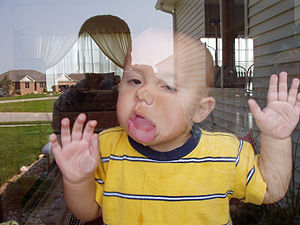Thursday, December 30, 2010
Slippery memories and the tasks of fiction
I recently had an opportunity to write a guest post for the online magazine OnFiction, whose focus is on psychological processes in the reading and writing of fiction. I chose to look at how novelists might benefit from embracing the reconstructive view of memory. You can read the piece here.
Thursday, December 23, 2010
Changes
If you have joined me from The Ladybird Papers, thanks for hopping over. As you'll have noticed, my focus has changed slightly over the last year, with more posts on autobiographical memory (reflecting the topic of my next book). I'll still be posting on developmental psychology topics, though, and anything else that takes my fancy.
Monday, December 20, 2010
Talking about the past
In my latest Psychology Today blog post, I pick up on the theme of memory development to examine the role played by conversations about the past in the organization of children's memories. This includes a look at some new research which shows that mothers' style of talking about the past with their preschoolers shows its influence even into adolescence. You can read the new post here.
Friday, December 3, 2010
The shifting boundary of childhood amnesia
Adults forget their early childhoods, but can children remember them? In my latest post on my Psychology Today blog, I look at some new research that addresses this question.
Monday, November 15, 2010
Voices in the head
My latest post on Psychology Today picks up on the theme of inner speech, and looks at the the connection with voice-hearing. You can read the post here.
Tuesday, August 17, 2010
What do we mean by 'thinking'?
Jad and the team at Radiolab have just released a new show, called Words. I talked to them about the role of language in the development of children's thinking. You can listen to the podcast here. And you really should check out the accompanying video as well.
Quite a few things came out of the discussion which I wanted to comment on some more. So I have written a post on my PT blog to explain in more detail how I see things working here. The post is called "What do we mean by 'thinking'?", and you can check it out here.
Quite a few things came out of the discussion which I wanted to comment on some more. So I have written a post on my PT blog to explain in more detail how I see things working here. The post is called "What do we mean by 'thinking'?", and you can check it out here.
Labels:
dialogue,
inner speech,
private speech,
thinking,
Vygotsky
Tuesday, August 3, 2010
Free will in childhood
The latest post in the Lego Stars Wars series is on the development of free will. You can read it over on Psychology Today. Meanwhile, over on the Facebook page, there are details of the summer giveaway - closing date coming up soon.
Friday, July 30, 2010
Picturing her dreams
I've talked a fair bit about dreams on this blog, but I haven't come anywhere close to this: check it out.
Saturday, July 24, 2010
Repetitive behaviours
Over at Psychology Today I've got a new blog post on repetitive behaviours in toddlerhood. You can read the piece here.
Please come and say hello on Twitter. And check out the Facebook page for news of a summer giveaway!
Please come and say hello on Twitter. And check out the Facebook page for news of a summer giveaway!
Monday, July 19, 2010
Gita Vygodskaya
I was saddened to hear the news from Moscow this week of the passing of Dr Gita L. Vygodskaya. Gita was Lev Vygotsky's eldest daughter and became an eminent psychologist in her own right. She had an important part to play in bringing Vygotsky's unpublished writings to publication, and she also wrote movingly about her memories of her father in an article entitled 'Remembering Father', which we included in our 1999 Critical Assessments of Vygotsky's work.
For me, one of the most memorable details of Gita's account was the description of life in the family's cramped Moscow flat. Vygotsky was already suffering from the tuberculosis that would kill him at age thirty-seven, and was hard at work on his masterpiece, Thinking and Speech. He nevertheless always found space for Gita to do her homework on the table beside him. It's a fact I always remember when my kids have their own work to do, and it's a wonderful reminder of a great genius and his pioneering, dedicated daughter.
Thanks to Marina Nelson for letting me know the sad news about Gita and for giving me permission to use the photograph.
For me, one of the most memorable details of Gita's account was the description of life in the family's cramped Moscow flat. Vygotsky was already suffering from the tuberculosis that would kill him at age thirty-seven, and was hard at work on his masterpiece, Thinking and Speech. He nevertheless always found space for Gita to do her homework on the table beside him. It's a fact I always remember when my kids have their own work to do, and it's a wonderful reminder of a great genius and his pioneering, dedicated daughter.
Thanks to Marina Nelson for letting me know the sad news about Gita and for giving me permission to use the photograph.
Tuesday, May 11, 2010
Mind-minded parenting, moral babies
A new post on my Psychology Today blog: I'm writing about our work on mind-mindedness and the possibility - as yet not fully tested - that certain interventions might increase parents' mind-mindedness.
Also this week, Paul Bloom's NYT piece on the moral lives of babies. Thanks to Rachel for pointing this one out.
Also this week, Paul Bloom's NYT piece on the moral lives of babies. Thanks to Rachel for pointing this one out.
Saturday, February 13, 2010
The anti-parenting thing
Last week on Psychology Today I posted a 'manifesto' for a new approach to parenting. The post has been tweeted about quite a lot, and I've had a couple of interesting comments on the post. See what you think - you can read the post here.
Also, just a reminder that tickets for the Royal Institution event are on sale now.
Also, just a reminder that tickets for the Royal Institution event are on sale now.
Saturday, January 30, 2010
Do as I do
 Image via Wikipedia
Image via WikipediaI knew about the classic work of Meltzoff and colleagues on neonatal imitation, but I'd struggled to see evidence of that kind of very early imitation in my own kids. Meltzoff's findings have not always been replicated, and when they are, they seem to require certain very specific experimental conditions to be in place. But it's also interesting that neonatal imitation has been suggested to be a kind of innate reflex that disappears quite soon after birth, only to re-emerge a couple of months later when more sophisticated, cortical brain systems take over responsibility. That's probably why parents don't usually see imitation until babies are a couple of months old. There were several times when I thought Athena was imitating a smile in the first few weeks, but I wasn't really convinced that it was happening until she was about seven weeks.
The starting point for the radio piece was the story I blogged about a few weeks ago, on newborns' ability to 'cry in' their own accent. I wanted to make the point in the interview that what's special about these findings is that they show that babies are capable not just of picking up information in the womb, but of using that knowledge to shape their own behaviour. They don't just learn the accent; they reproduce it for themselves. Imitation gets really clever when it works at a distance: when the mimicking is produced some time after the initial stimulus is perceived. We call this 'deferred imitation', and it really gets going in babies from after around six months.
A professional mimic is, of course, an expert in deferred imitation, and the comedienne Jan Ravens unsurprisingly stole the show with some very funny take-offs. But toddlers' imitation can be even more sophisticated. Babies and young children don't just imitation actions; they also imitate intentions. Some of the most interesting recent imitation research shows that children will copy what they thought an adult was trying to do, rather than what she actually did do. For example, a toddler watches a scenario where an adult is trying to drop a ping-pong ball into a cup. The adult misses the cup, and the ball bounces off the side of the cup and onto the table. What will the toddler do when given these materials? She will drop the ball straight into the cup. She will copy what she thought the grown-up was trying to do, rather than what she actually succeeded in doing.
There's also some great new research on over-imitation. This is where children don't just copy the actions that are essential to producing an effect; they will also copy extraneous additional actions which they seem to judge are important. For example, an adult shows a child how you can make a box make an interesting sound by pressing a button on the top. He then proceeds to press the button and elicit the sound, but not before tracing three completely pointless circles in the air above the box. The toddlers copy the button-pressing, but they also copy the irrelevant actions that precede it. Chimpanzees, in contrast, don't bother with all the fancy stuff; they just get on and press the button. It's as though the human children also want to imitate the adult's full set of intentions (the irrelevant actions as well as the relevant ones), rather than just the basic cause-and-effect.
There's plenty more that could be said about this complex and fascinating area of research, but for the moment here's the link to the show.
Subscribe to:
Posts (Atom)


![Reblog this post [with Zemanta]](http://img.zemanta.com/reblog_e.png?x-id=a35bf40c-fdae-430e-a3d9-746d4c5c72bf)
![Reblog this post [with Zemanta]](http://img.zemanta.com/reblog_e.png?x-id=d610e6c2-a070-4a89-a363-1326d1aa64ac)




